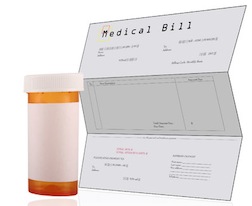How Can I Pay My Medical Bills After a Car Crash?
Use your Personal Injury Protection, through your own auto insurance policy – then get the at-fault driver’s insurance to reimburse PIP for you.
 In Oregon, every automobile insurance policy must include “Personal Injury Protection,” also known as “PIP. If you get an injury “arising out of the use, maintenance, or occupancy of a motor vehicle,” then your own insurance will pay up to $15,000.00 for your medical treatment under the PIP included in your policy. (Unless you are one of the few who paid extra to get coverage above $15,000 – check your policy to be sure!) They will only pay for medical treatment received in the first year after the accident, and only up to $15,000 – and your injuries must be from the use, maintenance, or occupancy of your vehicle.
In Oregon, every automobile insurance policy must include “Personal Injury Protection,” also known as “PIP. If you get an injury “arising out of the use, maintenance, or occupancy of a motor vehicle,” then your own insurance will pay up to $15,000.00 for your medical treatment under the PIP included in your policy. (Unless you are one of the few who paid extra to get coverage above $15,000 – check your policy to be sure!) They will only pay for medical treatment received in the first year after the accident, and only up to $15,000 – and your injuries must be from the use, maintenance, or occupancy of your vehicle.
In short, if you’re injured in a car accident, PIP should pay for all of the medical care related to that injury, up to $15,000, regardless of whether or not you have health insurance. In fact, your health insurer usually won’t pay bills related to car crash injuries, because they expect your PIP to pay them. With PIP, you should also be able to (within reason) choose your own medical care provider. Using both PIP and health insurance, you will hopefully be able to pay medical bills after a car crash.
Some PIP policies do have deductibles, but Oregon law does not allow the deductible to be over $250.00.
If you incur wage losses from your injuries, PIP will pay some of it-but not all. Usually PIP will pay 70 percent of your normal wages, up to a maximum of $1,250.00 per month.
In order to collect a wage loss from your PIP, however, you must have missed at least 14 consecutive days of work due to your injury. You’ll also need a note from a doctor saying that you were unable to work all of the days that you missed.
If you choose to use vacation or sick days while you’re injured, such that you’re not actually losing your wage by missing work, you can still get PIP to pay your wage loss, but the money will probably go to your employer and not to you. Then you would need to deal with your employer to get the sick days or the vacation days put back into your account in exchange for the PIP money that you’ve given back to your employer.
If you do not work for pay – for example, if you’re a stay-at-home parent – you can still collect a PIP “wage loss.” That is, if your vehicle-related injury prevents you from performing normal household functions (cooking, cleaning, childcare) for 14 days or more, PIP will pay up to $30/day for you to hire someone to do these tasks for you. Of course, $30/day is woefully inadequate, and will not generally cover all the help you need. But it’s better than nothing.
Collecting PIP means that you’ll have to cooperate with your insurance company. You’ll have to sign a medical release so that PIP representatives can access your medical records and speak to your doctors as proof of your injury. You’ll probably have to answer some questions and some insurance companies will even require you to give a recorded statement. Recorded statements can be dangerous territory-it’s better to avoid them. If you were already thinking of hiring a lawyer, you should definitely do so before you give anyone a recorded statement.
Make sure to take full advantage of everything that PIP has to offer-you have, after all, been paying premiums for that coverage for months or even years. And PIP can often make the difference between being able to pay your rent and being out on the street.
Once you have used your $15,000 in PIP or the full year has passed, whichever comes first, you will need to start using your own medical insurance to pay your medical bills. Both PIP and health insurance can be reimbursed with a successful personal injury settlement with the bad driver’s insurance company and should not raise your rates to pay medical bills after a car crash.
 Fewer Cases Better Results
Fewer Cases Better Results 




